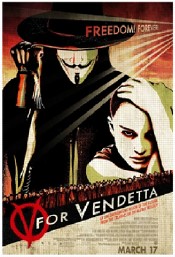Culture: Movies: 'V for Vendetta' tops the charts but smells of lotsa f/arts from the usual orifices
.
This blog-entry of Apr6,2k6 from Page 3 has been moved to refWrite Back on Jun19,2k6.
.
If you haven't seen it (as I haven't), but you're wondering whether you want to shell out the d$o (get rid of those "ough"s for the sound of a long "o" in Old Spell): then you mite as well start here: IMDb (Independent Movies Database) to get the (party) line on V for Vendetta, America's #1 Movie Hit at the box office r+t now (get rid of those "igh"s for a long "i" pronounced like "eye"). Well, even the writer of the book doesn't like the distortion introduced by the re-writers who produced the screenplay, none less than the Wachowski brothers whose Fargo I think was a fine film. Here's one of two summaries IMDb presents at the moment, this one by Alex W. (who's written a slew of summaries under a rash of monikers) is presumably just a neutral little summary.
As I said I haven't seen the flick, and I won't review it for that reason; but I add now that I have read several reviews, so I can and will review those – a kind of metareview of V for Vendetta. Comparing Alex W's pallid little summary with a lengthier piece, let's see what we haven't seen on screen. An online andin-print publication, Christian Compass (whose homophobia and other over-the-edge r+twing I lament), nevertheless has perked my interest as a metareviewer in what's being reported about and analyzed within the flow of frames projected onto the Big Screen under the V-name:
The first matter of comparison of these two review texts that I find significant is the efect of the IMDb writer, Alex W, coupled with his restriction of concern and interest to the plot; he can't take on issues of characterizatin; now, this circumstance is not entirely Alex W's fault. Indeed, it's proscribed to do anything but short and plot. That's IMDb's marketing formula for outside "little guy" contributions. It must have some intrinsic value elsewhere, as well. Because Alex W and some others have each written scscades of these short&plot "reviews" that eliminate the characters - that is the depth and artistry of characterization by which a movie character comes alive in the movie-goers imagination as a known person, however fictional. Yet within the narrows of of the prescribed terms and the proscribed possible alternatives to the the writing, Alex W has developed himself as at least a recognizable semi-pro.V for Vendetta Has Agenda
Christians, Conservatives Evil; Liberals, Freedom Fighters Good
by Luke Jalsevac “Artists use lies to tell the truth, politicians use lies to cover it up,” claims V, the heroic V for Vendetta movie's anti-hero with that soft, yet masculine voice that assures the audience of his great wisdom. This first half of this statement is a barely veiled self-congratulation on the part of V’s producers for their remarkable daring in using art to tell the truth. By the film’s end, however, I could not agree that politicians have a monopoly on covering up the truth; artists too can be quite adept at it.
Truth, freedom, and the power of words and ideas are central themes in this often cumbersome follow up project by The Matrix creator Wachowski brothers. Adapted from the graphic novel by Alan Moore [not the propagandist, Micheal Moore, mind you - A], it tells the story of a masked freedom fighter waging a solitary war against a fascist British government.
The first half hour of the movie is actually rather captivating as we learn that the masked crusader, always hidden behind a Guy Fawkes mask, intends to blow up the British Parliament in one year’s time as a symbolic gesture against the evil government and which he is convinced will result in the ushering in of a new world of freedom and peace.The remaining two hours of the film, however, are intermittently convoluted, boring and preachy, although punctuated by spurts of engaging acting by Hugo Weaving (the character simply known as V), and Natalie Portman (Evey) who ends
up joining him in his cause.As the tale unfolds, what at first was merely a fascist British government, adept at controlling its citizens through constant Orwellian propaganda and lies, begins to take on rather fascinating dimensions; the fascists, it is revealed, are Conservatives and Christians. What would a Hollywood movie be without these essential themes after all? It’s too bad V for Vendetta wasn’t released in time for this year’s leftwing, agenda driven, lets-pat-ourselves-on-the-back-for-our-bravery-in- dealing-with-tough-[I spell it "tuff" - A]issues’ Oscars. Michael Moore could have presented V’s producers with the “best-Bush-and-Christian- bashing-fiction-movie” award.
We discover that there is a distressing lack of church-state separation in this fascist Britain - an extremely powerful Christian clergy exerts an iron-grip censorship power on an unwilling country. But not just any clergy of course; that would not get the point across strongly enough. No. What is needed is a powerful bishop, who before being a priest was involved in underground prisoner experiments, with a fetish for hearing the confessions of young girls; not in the confessional, but rather in his ornate room complete with a wooden fourpost canopy bed.
Naturally, a Bush-run, I mean Christian-run, fascist state would not be sympathetic to the Koran, so owning one is an offence punishable by death. One character, a late Night Jay Leno type of talk show host, has a secret vault of many prohibited items including a British and American flag surrounding a Swastika (Americans are Nazis! - subtle, very subtle.), and an old, beautifully bound ancient Koran. He explains, when Evey asks him if he is a Muslim, that although he is not, he is able to appreciate its beautiful images. Evey is greatly impressed with his bravery in owning a Koran since its possession would result in his death if discovered. And to make sure that we don’t dismiss this statement as hyperbole, he is later captured and indeed executed for owning the Koran. Those Christians sure can be intolerant.
Oh, and did I mention that this talk show host also happened to be gay? Because of the Christianfundamentalist Nazi-like oppression of homosexuals he had to hide his sexuality from the deadly morality police by regularly having beautiful young women over to his house. The implicit result? Anyone who is against homosexuality is thereby for killing homosexuals.
The most poignant scene by far is when Evey, while in prison, finds the dying letter of a woman who had been in the same cell years before. As Evey reads the letter we are shown flashbacks of the life of this poor victim of state oppression.
After discovering in high school she was a lesbian, she falls in love with a beautiful girl and they end up living together. Flash to scenes of lesbian - marital - bliss. Cue soft lighting. House with a big bay window with the bright sun streaming in. Tea time. A red rose garden in full bloom in the background as the two lovers tenderly embrace - Cut to actual footage of the war in Iraq. Mayhem. Destruction. Chaos -. Cut back to delicate lighting, gentle happiness - Back to the harsh grainy footage from Iraq. More chaos - Back to soft lighting. Peace, tranquility - Soldiers burst into house. Gasp! Iraq has come to Bush, I mean Ameri -. I mean Britain. Are they the same? Gasp! Lovers separated from each other and dragged screaming from - marital - bliss and thrown into prison. Those intolerant Christi - I mean fascists do such terrible things when they are in power.
Not surprisingly, Alan Moore, the creator of the graphic novel the movie is based on, distanced himself from the movie. “The script is rubbish,” he said in an interview. In his novel, V is an anarchist fighting against fascist extremism. Moore, who describes himself as something of an anarchist, purposely pitted these two extremes against each other to challenge his readers. In an interview he stated: ”...the central question is, is this guy right? Or is he mad? Whatdo you, the reader, think about this? Which struck me as a properly anarchist solution. I didn't want to tell people what to think, I just wanted to tell people to think.”
Any good Hollywood liberal knows better than that of course. Letting people think can be extremely dangerous. The Wachowski brothers save the audience from this unpleasant burden by recasting these extremes as current American neoconservatism against current American liberalism. The result? No need to think. Conservatives are evil. Liberal “freedom fighters” are good.
V has received largely positive reviews from the critics, praising it for supposedly challenging audiences to think and raising timely questions about terrorism, when violence might be justified, and the power of government. By the end, the only thought running through my head was what a shame I had spent almost $15 on a propaganda piece that didn’t offer much character development or depth to compensate for being beat over the head with its message.
Now, Luke Jalsevac has questioned the movie he saw much more closely, and brawt out how the Wachowskis have positioned themselves in several dimensions and in regard to a number of subthemes.
And when we stand back to look at the two very different reviews, considering how the same movie could have begot both, we'd probably (I know I would) feel that Jalvac has gotten us much closer to any truth worth reflecting on in V for Vendentta. And setting aside any musing we mite indulge in regarding Jalsevac's distrubed take and dismissal of the Lesbian subtheme, nevertheless I was rather surprised when I happened onto a third review of the movie.
The Rotten Tomatoes movie-review site devotes a long webpage to V for Vendetta. It starts with a briefest summary of the "Critical Consensus."
Visually stunning and thought provoking, V For Vendetta's political pronouncements may rile some, but it's story and impressive set pieces will nevertheless entertain.We get in the next section of the review called "Synopsis" another brief telling of the plot, a telling that has narrative flow, great pace with no fat, and clarity regarding the story-line. It is longer than Alex W's, but not much. Yet it is much more inviting, apppetite-creating, in comparison to which Alex W's bit is both shorter and more flat. The credits and technical details are appended to the plot summary. Next the author at Rotten Tomatoes notes lapses in the film's continuity, small but disconcerting moments where's there's a slippage of the gears between one moment and a consecutive moment where blood is all gone or the mask no longer has an open mouth-hole or .... An excellent film has zerodiscontinuities, unless the whole work is absurdist, Monty Pythonesque perhaps.
But there's more, something more philosophical or capable of raising philosophical questions in minds already predisposed to that activity.
V For Vendetta is set slightly in the future, where modern day London is still very recognizable. Creators Moore and Lloyd were influenced by the times in which they lived. "Our attitude towards Margaret Thatcher's ultra-conservative government was one of the driving forces behind the fascist British police state we created in Vendetta," Lloyd explains. "The destruction of this system was V's primary reason for existence."
Thematically, Moore and Lloyd's series explores many political and ethical notions of continuing relevance in today's world. "The principal message of the original is that every individual has the right to be an individual, and the right - and duty - to resist being forced into conformism," comments Lloyd. "V resists by directly attacking government installations and murdering the regime's supporters. So it's not just a story about a battle against an evil tyranny, but a story about terrorism and whether terrorism can ever be justified - and that's something we have to try to understand if we're ever to solve the problem of it in the real world."
Then the review gives the ostensible director, a Wachowski assistant on a previous flick-project, a voice of his own, "We felt the novel was very prescient to how the political climate is at the moment. It really showed what can happen when society is ruled by government, rather than the government being run as a voice of the people. I don't think it's such a big leap to say that things like that can happen when leaders stop listening to the people." How specious a remark that is: nawty that "society is ruled by government." As tho that can ever be escaped, or ever should be escaped. The only question is: which government? And what does it mean to say "the govt being run as a voice of the people." What is "the people"? This is all Rousseauvian nonsense, to my mind. But what can you expect from a Wachowski assistant fronting for the brothers on his own first directorial project?
I could go on, as the review is long and requires considerable scrolling, but it is a warm and invigorating read. One thing that emerged for me was the sense that this movie is really about a fictional Britain and only the most jaundiced Americans would dismiss its location as less than authentic to the movie's sense of place and history. Americans who don't know much about Britain and its history will have little sense of the specificites by which the move-makers attempt to project a further and therefore fully fictional "histor" allegedly foreseeable by selectively extrapolating certain trends in this one. So, I think Jalsevac is up a wrong tree on that aspect of his "reading" the film.
As to the Lesbian subtheme LJ reports, I notice that Rotten Tomatoes has none of it - neither for good nor for ill regarding the movie. The one passage in RT that comes anywhere near what LJ finds is this brief passage:
The course of V's life, and subsequently Evey's as well, has been unalterably impacted by a woman named Valerie Page - a woman who neither of them ever met. Her story is one of the thousands of those who were tortured and killed by the government's callous cruelty and persecution of those it deemed unfit - and also a story of the small shred of hope that can ignite a revolution.". Thus, I doubt Evey's lover is this Valerie Page, so the Lesbian subtheme has disappeared from RT's account. I'd go see V for Vendetta were I still a movie-goer, as in my old age I am not. Nowadays I don't even have a DVD player, so the chances of seeing this movie are indeed slim - until it's on TV, of course. But I had a most enjoyable time reviewing the reviews I've cited, especially that of the apparently anonymous writer of RT's long but rewarding piece. Yet, he does seem to have erased what could be a significant element in the movie, and one must ask why. On the other hand, I don't think Jalsevac get it r+t either, as I had asked Owlhoot at Christian Homomemo to look into what Jalsevac thinks is a thrown-in Lesbian-exploitation theme in the Wachowski bros piece.Christian Homomeno has recently pointed out some interesting considerations in regard to understanding the specificities of the film's treatment of the Lesbian lovers, at least as LJ has described them, their behaviour, and their setting to us. - Anaximaximum [I'll do some editing and fix some spellings later. Good nite, again! - A]
Back to refWrite frontpage
Back to refWrite...page 2


 >br>
>br>









No comments:
Post a Comment